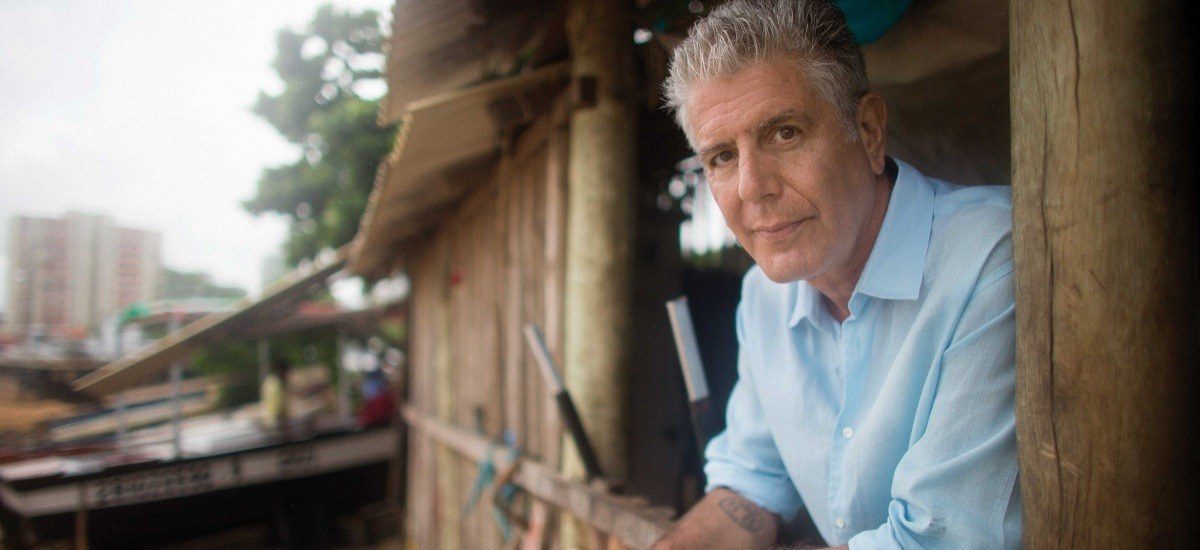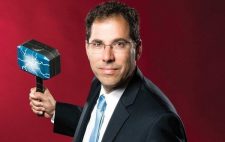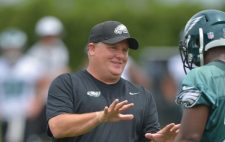Take a trip with celebrity chef Anthony Bourdain and you’re in for a pretty wild, rather twisted and sometimes even dangerous experience. As host of CNN’s “Parts Unknown,” the Jersey native has skyrocketed as a foodie fan favorite, but he’s also cultivated a following among viewers who don’t care so much about the exotic cuisine he’s discovered – they just want to see what he’ll do next.
Bad-boy chef Anthony Bourdain, 58, whose drug use, drinking and cursing is well documented, has not only survived, but thrived. He traded in his chef hat for television 14 years ago and is currently at the helm of “Parts Unknown” on CNN, a travel and food show that just completed its third season. Taking viewers to exotic locales like Vietnam and Russia, Bourdain dives into the local cuisine and culture. Always willing to try something new, he’s eaten sheep testicles, an entire cobra – including the beating heart – and a raw seal eyeball.
“I’ve really only been poisoned twice – horribly ill to the point that I needed help,” he says. “Both were tribal situations in Africa where I had a pretty good idea going in that there were going to be repercussions. But it was about showing respect. I had to eat what everybody else was eating, and I ended up getting very ill.”
Somehow, those experiences haven’t changed his resolve to eat whatever’s put in front of him. He would prefer not to eat shark fin, dog or cat, so he tries to avoid situations where he’d be offered those foods. He also won’t turn down a drink, alcoholic or otherwise, when the act might insult his host.
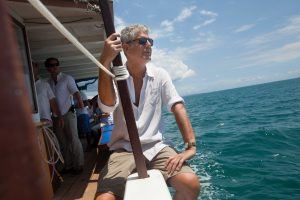
Anthony Bourdain opened season three of “Parts Unknown” in Brazil
“I like to observe local custom, whatever it might be,” he says. “In Russia, for example, I would not personally choose to drink 17 shots of vodka, but it’s difficult not to sometimes in certain social situations. If I’m doing a lot of drinking in a scene, I’m quite sure – more and more these days – to schedule a long period of napping, rest and recovery afterward. I can’t go right from drinking 17 shots of vodka to another meal scene. That’s just not going to work.”
So how did the boy from Bergen County develop such a daring palate? “I am no more adventurous than most chefs I know,” he says. “If you like food and people who cook food and you’re curious about how other people eat, then you’re willing to try new things.”
In his best-selling book “Kitchen Confidential,” published in 2000, Bourdain talks of visiting his grandparents in France as a child and tasting oysters for the first time. That experience spawned his curiosity to try all kinds of unusual food. While attending Vassar College, he worked in seafood restaurants in Provincetown, Mass., and found his true calling. Bourdain ultimately dropped out of Vassar but went on to get a degree at the Culinary Institute of America and built a long resumé of restaurant jobs that led him to become executive chef at Brasserie Les Halles in New York City.
Bourdain’s popularity exploded after writing the harshly honest “Kitchen Confidential,” and that led to his first TV show, “A Cook’s Tour,” on the Food Network in 2002. He has hosted several shows on various networks, each focusing on faraway places and exotic cuisine.
“I don’t have any special mission in mind with the show. I’m just trying to have fun, pursue things I’m really interested in, tell a story and hope that what’s intriguing and interesting to me is interesting to other people,” he says. “If people watch the show and feel inspired to maybe travel to someplace they haven’t thought of going, or if they wonder what it might be like to walk in somebody else’s shoes or eat out of their comfort zone, that’s a good thing. I just see myself as a storyteller.”
As for choosing show locations, “Anything could inspire me or bring me to a place,” he says. “I’ll look at a map or if there’s an issue – something that I read in the paper or in a novel or seen in a film that’s inspired me. Maybe it’s a place I’ve always dreamed of going, or I’ll meet somebody who has a great story or a connection to a place.”
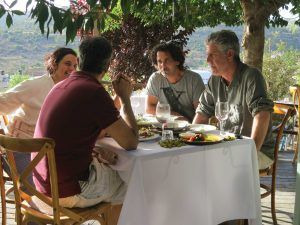
Bourdain eats with locals at a restaurant 20 minutes outside Jerusalem
While on location, Bourdain always seeks out a guide to accompany him and educate him about the food and culture. “There’s an entire species of professional fixers, people who, for a living, work with film companies and news organizations,” he says. “We’re very careful about who we choose to help arrange things on the ground. Ideally it’s a chef, because that means we’re already speaking the same language, even if we’re not speaking the same language.”
Unfortunately, no matter how careful he is, things don’t always work out as planned. In 2008, as host of “No Reservations,” Bourdain visited Romania to disastrous results.
“It was clearly a disaster from beginning to end,” he recalls. “It’s pretty apparent right away when it doesn’t work out. There’s no backing out. There have been a couple of shows when our fixer was full of shit. They said they knew this or that or had this kind of a relationship with a particular place, but when we arrived they really didn’t. Often that ends up being something we overcome, and other times it’s a complete and utter disaster. It’s apparent on-screen, but often to very humorous results. For better or worse, sometimes when I’m miserable or frustrated, it’s apparently entertaining.
“When things go right, we put them up there on the screen, and when they go wrong, we put them up there on the screen. The most recent example was the Sicily show last season, where everything just started to go horribly wrong. I had a mini emotional meltdown on camera and spent the rest of the episode manically depressed. That’s pretty typical, I’d say.”
Fortunately, most shoots have a happier ending. Bourdain’s favorites include locales in Southeast Asia. “That’s a beautiful part of the world with really interesting food,” he says. “I’d like to go to Iran soon. I hear the food is fantastic, and it’s a very surprising place. On a government-to-government basis, things are very different than among ordinary people. The fact that I know so very little about it makes me curious about the place.”
Bourdain is able to get into places where typical tourists can’t go, such as Cuba.
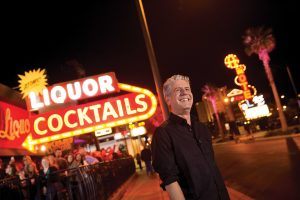
After the season two finale of “Parts Unknown,” Anthony Bourdain hosted a live retrospective episode from Atomic Liquors in Las Vegas
“I’m not going in for a hard news story, and that makes it generally easier for me to go to a place where our political relations are antagonistic or even countries where my own political beliefs are very much in contrast to the political beliefs in that location. I’m going in there asking simple questions like, ‘What do you like to eat? What makes you happy? What’s your life like?’ You’re always going to get an interesting answer. Cuba is a country I had a terrific time in and met a lot of very nice people. In a perfect world, it’s definitely not a political system I would choose to live with, but I’d love to go back.”
As the celebrity chef blazes his own trail, he says he carefully avoids pitfalls many of his peers have fallen into. “There’s a pervasive terror – people are fearful they won’t be on television anymore,” he says. “I think not giving a shit about that is an integral part of what I do. I’m never going to make television with that kind of concern first: what if audiences don’t like it, what if we don’t get ratings, what if the bosses find it offensive? I don’t care about those things. I’m out there making the best television I can, that interests me and is fun to make, in the hope that other people will like it. If the day comes that they don’t, I’ll find something else to do.”
So far, that’s not been a problem for the man who has reinvented himself many times over. He came from humble beginnings as a dishwasher and moved through the kitchen ranks to chef. He’s starred in several shows, made a cameo appearance in the FX animated series “Archer” and wrote for HBO’s drama “Treme.” With buddy Eric Rupert, he even started his own chocolate business, selling specialty candy bars for $15 a pop.
“We only made 10,000 bars per season, so it was never an enterprise I expected to make money on,” he says. “Any money I make goes to charity, so we did some good in the world, it was a good product and it was a fun experience.”
Bourdain continues to evolve and try new things, but he doesn’t look back, and he doesn’t miss being a chef.
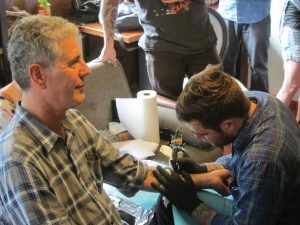
: Earlier in his career, Bourdain got a tattoo in Texas for the Travel Channel’s “No Reservations”
“I had 30 years of being a chef,” he says. “I broke out with ‘Kitchen Confidential’ at age 44. I was not getting any faster, better or smarter. I’m very aware of how lucky I am and what a great job I have. I have a hell of a lot of fun, and even though I travel 250 days a year, I’m still spending more time with my family than I would have been able to as a chef.”
That family includes his second wife, Ottavia Busia, and 8-year-old daughter Ariane. Ottavia, a martial artist, eats only animal protein, and avoids pasta and starches, according to Bourdain. So when he’s home, he and Ariane cook together. His wife and daughter sometimes travel with Bourdain to locations, and Ottavia has appeared in several episodes.
“Now my daughter’s in first grade, so I can’t take her out of school frequently,” he says. “Maybe once a year I’ll take the family on a shoot, but they don’t travel with me as much as I’d like.”
Bourdain admits that fatherhood has changed him “as much as anyone is changed by fatherhood – immediately, completely, deeply, in every possible way. Your whole notion of yourself disappears. There’s someone so much more important to you and more important than you in your life. I used to be the center of the universe – now it’s my daughter.”
Bourdain’s rules about the dos and don’ts of eating in restaurants – such as don’t eat fish on Mondays – have softened over the years. “The fish-on-Monday concern really changed,” he says. “If you’re eating in a saloon on a Monday, the fish special might not be the way to go, and on holidays maybe eat early in the shift. I’d probably eat my eggs Benedict closer to the opening of brunch than the closing, but the behavior in kitchens has changed. The whole level of prestige that chefs enjoy has really changed the landscape.”
CNN’s “Parts Unknown” shoots eight episodes a year, spending a week to 10 days in each location. During the nine weeks of post-production for each show, Bourdain is often off to the next location. But he insists his grueling travel schedule isn’t a problem.
“Practice makes perfect; I’ve been doing this for 14 years now,” he says. “I don’t get jet lag anymore. I smell jet fuel and I fall asleep, so as long as I get my sleep on the plane or elsewhere, I’m OK. I spend a lot of time in airports, but I’m pretty good at it. I expect things to go wrong, but I regularly see incredible things in incredible places and have experiences that few other people on the planet have been able to enjoy. I’m very grateful for that.”
Given the choice of a last meal, Bourdain doesn’t miss a beat. “I don’t know if you’ve seen the film ‘Jiro Dreams of Sushi,’ but that guy Jiro Ono has a restaurant in Tokyo where I had one of the most extraordinary meals I’ve ever had,” he says.
Some of his other favorite places include his N.J. roots. “I grew up going to Long Beach Island and have very happy memories of catching blowfish off the pier,” he says. “I still take my daughter across the river to go to Fort Lee to eat hot dogs at Hiram’s.”


